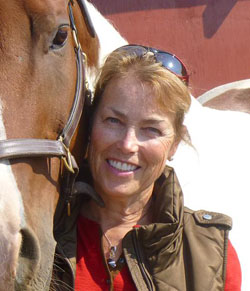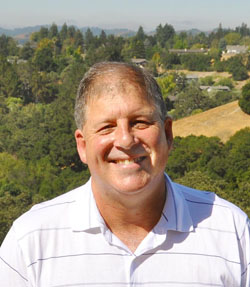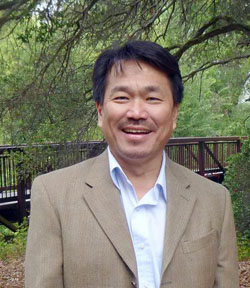
|
||||||
Why are they running?
Both Chew and Trotter say that they love Moraga, have proven track records on the Town Council, and are proud of the town's balanced budget and frugal spending over the last eight years.
Chew points out that he championed the establishment of the Climate Action Plan, while Trotter credits his persistence and tenacity, in part, to the work that led to the passage of Measure K and the restoration of Moraga's roads.
Onoda believes that the town is at a tipping point and that the completion of the many proposed developments could change its character. She wants to preserve the quality of life for Moraga residents.
Development and the Moraga Center Specific Plan
Onoda believes that there is a problem with the implementation of the Moraga Center Specific Plan. "It is too dense," she states, adding that the cumulative impacts of proposed development projects, especially on schools and roads, needs to be better understood.
Trotter and Chew served on the Town Council that approved the Moraga Center Specific Plan. Trotter supports the planned 620 units. "The Camino Ricardo project went through with great collaborative effort, this is a successful piece of the puzzle," he says. "The total build up is subject to a traffic budget, it cannot exceed the projected traffic from a single-family residential development of about 334 units." He explains that the plan will have to include a mix of different types of housing with different traffic impacts.
Chew says he is not concerned with the implementation of the Moraga Center Specific Plan because overall it abides by the town's General Plan and every project will be individually scrutinized. "There will be plenty of opportunity to make sure that each project conforms to the General Plan," he states.
Finance and Asset Management
Chew says that he is concerned that the town has not saved enough for a complete asset replacement plan. The town owns several buildings, police vehicles, and equipment, among other things. "When it breaks, we replace it, but if we want to implement such a plan fully, it will take a lot of money," he says. Chew thinks that the Palos Colorados development fees, several million dollars likely to land in town coffers in 2015, could be used in part to fund an asset replacement plan.
Onoda says she favors conservative management of the town's money. "Moraga has to continue to be managed with a balanced budget," she says. She applauds the work that was done with Measure K and promises that she will make sure that all the money is used for infrastructure maintenance.
Trotter promises to continue to push budgetary frugality. "We cut the spending by $1 million during the recession when I was mayor; the town lives within its means," he states, adding that he will continue to make sure that money from Measure K will be used only for the roads.
Economic Development
Trotter notes improvements in the occupancy rates at Moraga's shopping centers. "What Gayle Somers is doing (HomeMade Kitchen Caf‚ and Bakery) is a great example of people investing in the community and finding a niche," he says, adding that there are still unmet needs for things such as a sports bar and student housing.
Chew believes that Moraga has made a lot of progress in the last eight years; processes for businesses have been streamlined and town staff is more supportive. "We attracted some very good sales tax generators, like TJ Maxx, Orchard and Home Goods," he says.
Onoda says that the community is educated and sophisticated and that the shopping and dining scene should reflect the population. She is looking forward to fostering the creation of a more friendly public space. "As an artist I see things that others do not," she says.
Open Space Preservation
Trotter and Onoda favor strengthening the rules that regulate ridgeline and hillside development in Moraga to ensure consistency in the way development decisions are made. Chew says that there is a town council subcommittee currently working on possible language and suggestions to clarify and improve on the protection of open space and ridge lines, and development on slopes. "I look forward to receiving these recommendations," he says.
Recreation and the Rheem Theatre
Onoda believes that the Palos Colorados money should primarily go to recreation. "We have to look at the entire population and decide what makes most sense," she says. With the Rheem Theatre now for sale, she thinks that the building can remain a theater or become something else.
Trotter believes, and has advocated for years, that the town needs a community gym. He notes that the Hacienda de las Flores is destined to become a community center, after some improvements. He believes that the Rheem Theatre is one of the defining and vibrant symbols of Moraga and local government has a legitimate role to play in its preservation.
Chew would rather look at existing facilities rather than constructing new ones, and save developer fees for existing asset replacement and maintenance. As far as the Rheem Theatre is concerned, he believes the town should continue to support the theater and ensure that a long term solution is found.
Teresa Onoda is a recognized painter who often uses Moraga's beautiful landscape as her inspiration. She was an art teacher before moving to town with her family in 1989; her children were ages 4 and 6 at the time. Onoda launched the Preserve Lamorinda Open Space Art Show in 1990 to support the ultimately successful battle against a golf course that was planned for the Palos Colorados development. She was appointed to the Moraga Planning Commission a year and a half ago. If elected, Onoda would be the only woman on the Town Council and she believes that her presence would make that elected body more representative of the town's population.
David Trotter is an attorney and partner at Bowles & Verna LLP, a law firm in Walnut Creek. His practice includes civil litigation, land use planning, environmental and real estate law. He served on the Moraga Planning Commission for more than six years in the '90s. He and his wife raised four children in Moraga.
Ken Chew is a native of Malaysia and came to the United States as a student. He holds a degree in civil and environmental engineering. Chew works for the California Department of Transportation in Oakland, where he is in charge of project management control. He and his wife raised two sons in Moraga. Prior to running for Town Council he served on the Moraga Planning Commission.
Candidates Night
Learn more about the candidates at the Moraga Citizens Network's Candidates Night, starting at 7:30 p.m. on Wednesday, Oct. 1 at the Holy Trinity Cultural Center, 1700 School St. in Moraga. A video of the debate will be available the next day on our website, www.lamorindaweekly.com.


Reach the reporter at:
